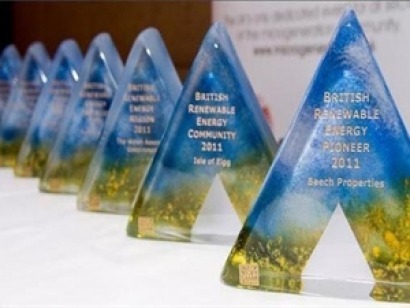
The 7th annual British Renewable Energy Awards organised by the UK’s Renewable Energy Association (REA) paid tribute to the renewable energy industry’s achievements at a packed gala dinner attended by over 300 people in the boutique Kensington hotel, the Jumeirah Carlton Tower, in London.
Hosted by UK BIG Lottery Fund Chairman, Peter Ainsworth, the inaugural Judges’ Award was shared by two worthy winners, Connie Hedegaard, the EU's first Climate Action Commissioner, and Chris Matthews of the Co-operative Bank, recognising their outstanding lifetime contribution to renewables.
“These awards recognise outstanding achievement in the British renewable energy sector. They are a tribute to innovation and excellence. The exceptional quality of all the shortlisted entries serves to demonstrate the exacting standards, talent and originality within this industry,” explains REA’s Chief Executive, Gaynor Hartnell. “We received a record number of over two hundred nominations for this year’s Awards. We would like to thank all those who participated – your effort and dedication to this vibrant and growing sector is inspiring.”
The full list of the Award winners and runners up are listed below:
Technological Innovation
Runner up: National Grid
Winner: Glosfume Ltd
Manufacturer / Employer Award
Winner: G24 Innovations
Community Award
Runner up: Fintry Development Trust
Winner: Camphill Community Glencraig
Pioneer Award
Runner up: Marks & Spencer
Winner: Stockport Homes
Flagship Project Award
Runners up: Ebico Limited and Eden Project Limited and Eco2 and BNP Paribas Clean Energy Fund
Winner: The European Marine Energy Centre (EMEC) Ltd
Installer Award
Runner up: Norfolk Solar
Winner: Dulas Ltd
Journalist Award
Winner: Damian Carrington – The Guardian
Judges’ Award
Winners: Connie Hedegaard, the EU's first Climate Action Commissioner and Chris Matthews of the Co-operative Bank
REA welcomes Scotland’s Marine Energy Action Plan
One of the winners, EMEC, scooped the accolade at the REA event for its achievement in establishing itself as the world’s leading marine renewable test centre, offering developers the opportunity to economically trial new technologies in real-sea conditions.
Established in 2003, EMEC is the only accredited wave and tidal test centre for marine renewable energy in the world, with berths for 14 full-scale devices to be tested simultaneously in some of the harshest weather conditions, while producing electricity to the national grid through the company’s infrastructure.
Richard Morris, commercial director of EMEC, who accepted the award, said: “To be named flagship project of the year by the industry really demonstrates the success story that EMEC has become in delivering the first fully-accredited test facility for the marine renewable industry, and we are privileged to be given such recognition.
"Since EMEC was founded, we have expanded our capability to ensure we remain the world's leading facility for wave and tidal energy conversion technology, offering developers an opportunity to test in real-world conditions, while delivering consultancy to our international partners with whom we form a network to drive the industry forward.
The same week as the awards saw the publication of the Scottish Government’s Marine Energy Action Plan, which both demonstrates successes achieved to date and outlines next steps to further develop this exciting industry. This plan will clearly impact on EMEC’s work, and was welcomed by REA, although the association has some concerns.
“It is very important to celebrate our successes in marine renewables as this document does. Just last night at the REA annual awards ceremony I had the privilege to present the award for Flagship Project to the team at the European Marine Energy Centre. The REA is also delighted that Scotland has such ambitious plans to take forward the local wave and tidal energy sector,” REA’s Head of Marine Renewables, Dr Steph Merry, said last Thursday. “However, if this ambition is to be achieved, Ofgem must act urgently to provide a more equitable transmission charging regime for electricity generation in the Scottish Islands, where many wave and tidal projects are concentrated.
“Under current proposals, the Western Isles may be faced with a charge of £77 per kW per annum. For a 100MW project in this region, this represents an additional charge of £6.7 million each year when compared with a similar project in Wester Ross, less than 40 miles away.”
For additional information:

